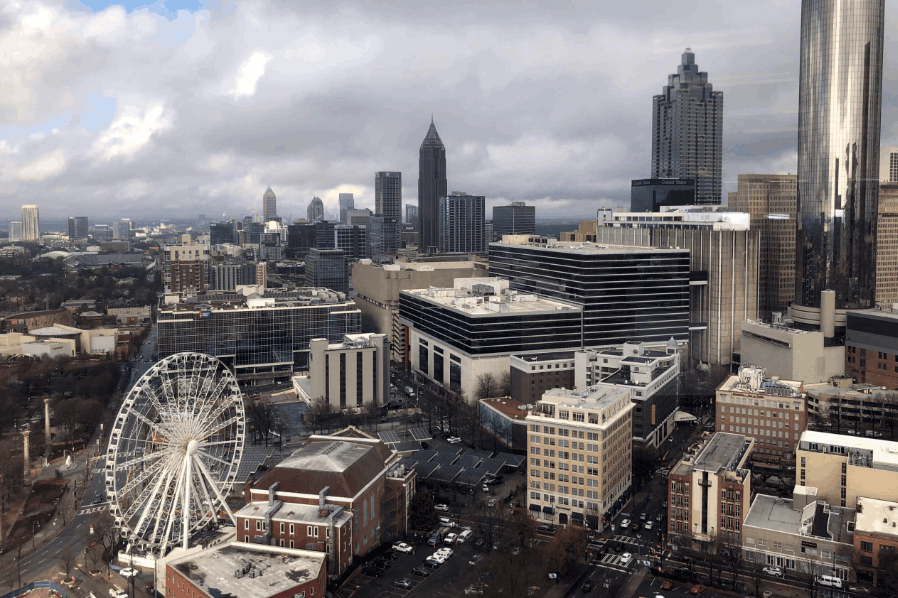What’s Trending in the Atlanta Commercial Real Estate Market?


The Atlanta commercial real estate market is constantly evolving, driven by a mix of economic growth, urban development, and shifting business needs. As one of the fastest-growing cities in the United States, Atlanta continues to attract investors, developers, and companies looking to capitalize on its dynamic market. In this blog post, we’ll explore the latest trends shaping Atlanta’s commercial real estate landscape and what they mean for investors and businesses.
1. Tech Industry Expansion and Office Space Demand
Atlanta’s tech industry is booming, with more startups, tech giants, and innovation hubs calling the city home. This expansion is driving demand for modern, flexible office spaces, particularly in areas like Midtown, where tech companies are concentrated. Coworking spaces, tech campuses, and creative office environments are in high demand as companies seek to attract top talent and foster collaboration.
Key Areas to Watch:
- Midtown: Home to Georgia Tech and numerous tech startups, Midtown continues to see strong demand for tech-focused office spaces.
- Buckhead: A growing number of tech companies are moving to Buckhead, drawn by its upscale amenities and easy access to transportation.
2. The Rise of Mixed-Use Developments
Mixed-use developments, which combine residential, commercial, and retail spaces in one location, are becoming increasingly popular in Atlanta. These developments cater to the city’s growing population and the demand for walkable, live-work-play environments. The BeltLine, Ponce City Market, and the new Westside developments are prime examples of this trend, offering a blend of apartments, offices, shops, and dining options in one cohesive space.
Popular Mixed-Use Projects:
- The BeltLine: A 22-mile loop of multi-use trails, the BeltLine connects various neighborhoods and is surrounded by new mixed-use developments.
- Ponce City Market: This historic building has been transformed into a vibrant hub of retail, office, and residential spaces, setting the standard for mixed-use development in Atlanta.
3. Growth in the Industrial and Logistics Sector
Atlanta’s strategic location as a transportation hub makes it a key player in the industrial and logistics sector. With e-commerce on the rise, there’s a growing demand for warehouses, distribution centers, and last-mile delivery facilities. Industrial real estate in Atlanta is experiencing significant growth, particularly in areas near major highways and the airport.
Hotspots for Industrial Development:
- South Atlanta: Proximity to Hartsfield-Jackson Atlanta International Airport and major highways makes South Atlanta a prime location for logistics and industrial facilities.
- Westside: This area is seeing an influx of industrial development due to its strategic location and access to transportation infrastructure.
4. Suburban Office Space Surge
While downtown Atlanta remains a focal point, there’s a noticeable shift towards suburban office spaces as companies seek more affordable and accessible locations. Suburban areas like Alpharetta, Sandy Springs, and Peachtree Corners are witnessing a surge in office development, catering to businesses that prefer to operate outside the city center. These areas offer lower costs, less traffic, and proximity to residential neighborhoods, making them attractive to both businesses and employees.
Key Suburban Markets:
- Alpharetta: Known as the “Technology City of the South,” Alpharetta is a hotspot for tech companies and offers a thriving business environment.
- Sandy Springs: With its proximity to downtown and high-quality office spaces, Sandy Springs continues to attract companies looking for suburban office locations.
5. Sustainability and Green Building Initiatives
Sustainability is no longer a trend but a necessity in Atlanta’s commercial real estate market. Developers and investors are increasingly focusing on green building practices, energy efficiency, and sustainable design to meet the growing demand for environmentally friendly properties. LEED-certified buildings and properties with renewable energy sources are gaining popularity, driven by both regulatory requirements and consumer preferences.
Sustainable Development Trends:
- LEED Certification: More commercial properties in Atlanta are aiming for LEED certification, signaling a commitment to sustainability.
- Smart Buildings: The integration of smart technologies, such as energy management systems and automated controls, is becoming more common in new developments.
6. The Impact of Infrastructure Projects
Ongoing and planned infrastructure projects are reshaping Atlanta’s commercial real estate market. Improvements to transportation networks, such as the expansion of MARTA and the redevelopment of major highways, are making previously underdeveloped areas more accessible and attractive for commercial development. These projects are expected to spur growth in areas that were once overlooked, creating new opportunities for investors.
Infrastructure Highlights:
- MARTA Expansion: The expansion of Atlanta’s public transit system is enhancing connectivity and driving demand for commercial real estate near new transit stations.
- Highway Redevelopment: Projects like the reconstruction of the I-285/GA-400 interchange are improving traffic flow and accessibility, benefiting nearby commercial properties.
7. Increased Demand for Multi-Family Properties
With Atlanta’s population growth showing no signs of slowing down, there’s a continued demand for multi-family properties. Investors are keen on developing and acquiring apartment complexes, particularly in urban areas and transit-oriented developments (TODs). These properties offer stable rental income and the potential for appreciation as more people move to the city.
Popular Multi-Family Markets:
- Downtown and Midtown: These areas continue to attract young professionals and students, driving demand for rental units.
- Eastside and Westside: Emerging neighborhoods with easy access to the BeltLine and public transit are becoming hotspots for multi-family development.
8. Retail Market Transformation
The retail landscape in Atlanta is evolving, with traditional retail centers adapting to new consumer behaviors. E-commerce and changing shopping habits are pushing retailers to rethink their strategies, leading to a focus on experiential retail, entertainment, and dining. Mixed-use developments with retail components are thriving, as consumers seek destinations that offer more than just shopping.
Retail Trends to Watch:
- Experiential Retail: Retailers are incorporating more experiences, such as dining, entertainment, and events, to attract customers.
- Pop-Up Shops: Temporary retail spaces and pop-up shops are gaining popularity, allowing brands to test new markets and concepts.
9. Revitalization of Historic Neighborhoods
Atlanta’s historic neighborhoods are experiencing a renaissance, with a focus on preservation and adaptive reuse. Areas like Old Fourth Ward, Inman Park, and West End are seeing a wave of development that blends the old with the new. Historic buildings are being repurposed into modern commercial spaces, attracting businesses and consumers who value the character and charm of these neighborhoods.
Notable Revitalization Projects:
- Old Fourth Ward: Once an industrial area, Old Fourth Ward has transformed into a vibrant neighborhood with a mix of residential, retail, and office spaces.
- West End: Known for its rich history and cultural significance, West End is undergoing revitalization with new commercial and mixed-use developments.
10. The Influence of Corporate Relocations
Atlanta continues to be a top destination for corporate relocations, with companies drawn to its strategic location, talent pool, and quality of life. Major corporations relocating to Atlanta bring with them a demand for office space, residential units, and commercial services, fueling growth in the commercial real estate market.
Recent Corporate Moves:
- NCR Corporation: The relocation of NCR’s headquarters to Midtown Atlanta has spurred development in the area, including office spaces and amenities.
- Microsoft: Microsoft’s decision to open a new campus in Atlanta has generated significant interest in the city’s tech sector and commercial real estate.
Conclusion
Atlanta’s commercial real estate market is vibrant and full of opportunities, driven by economic growth, urban development, and evolving trends. Whether you’re an investor, developer, or business owner, staying informed about the latest trends can help you make strategic decisions and capitalize on the market’s potential. From the rise of mixed-use developments to the expansion of the tech sector, Atlanta continues to offer exciting prospects for those looking to invest in commercial real estate.
Ready to explore what’s trending in Atlanta’s commercial real estate market? Contact us today to learn more about available properties and how we can help you achieve your investment goals.
Categories
Recent Posts











"My job is to find and attract mastery-based agents to the office, protect the culture, and make sure everyone is happy! "
